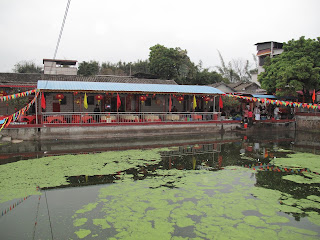Living in China for the past 18 months I was unaware of having any relatives in China. Most of my family presently live in the UK where I was born and also Mauritius where my parents’ generation are from. However, an eye-opening trip to Meixian; the birthplace of my ancestors soon proved me wrong. Accompanied by my parents, my uncle and aunt from the UK and my father’s oldest brother and his grand-daughter from Mauritius, I travelled to Meixian to find out more about my Chinese roots and try to find some of the answers to questions I had about the emigration of the family from Meixian to Mauritius.
 |
| The Chan Tanghao |
 |
| View of the Tanghao from the lake |
As dusk fell, each family sat down at their reserved table and eagerly awaited the banquet whilst drinking toasts of Baijiu to welcome the new year. My family meanwhile, was ushered to the head table because my eldest Uncle was a honoured guest at the celebration. I observed the scene before me with much wonder; it was a raucous, colourful celebration which is usual for Chinese tradition. Suddenly the food started arriving; I had no clue how they were going to feed 800 people at the same time but the cooks and the servers though noisy and brusque, handled it with ease and one by-one a dish of steaming food was placed on the table before us. The food was plentiful and absolutely delicious; amongst the 12 or so plates were well-known Meixian dishes, for example, braised belly pork on preserved vegetables, steamed corn-fed chicken and fish ball soup. I was quite relieved that we were not treated to a dog casserole which was the case when we had lunch at the compound a few days before.
During the banquet the head of the clan said a few words and acknowledged my family travelling all the way from England and Mauritius. My eldest Uncle beamed in pride for this place had been his home from the age of 5 to 15 years old. I tried to imagine him as a little boy running around the compound and my grandmother working hard to provide for the family. Returning to his old home in China and clan meant so much to him and it was wonderful to share the experience and learn more about his life there with his mother, my grandmother. She and my grandfather was one of the thousands of immigrants who left Meixian to find work in Mauritius. Following the birth of her two sons and daughter, my grandmother returned to Meixian with the children and lived in the same area with the other Chans, managing a small shop.
 |
| Outside the place where my grandmother lived |
On my return back to Nanjing in China, where I live, I told all my Chinese friends about the trip, the massive banquet and what I had found out about my roots. I was very surprised to hear that they had no Tang hao or did not know what generation they were from. It would appear that in modern day China that this it is rare to follow such traditions but I for one, have come away feeling humbled by the whole fascinating experience and insights into my ancestor’s lives.

